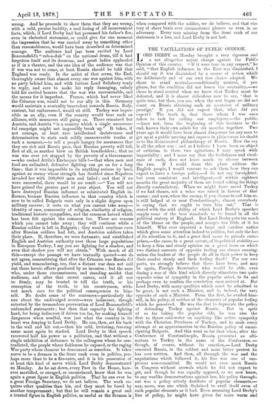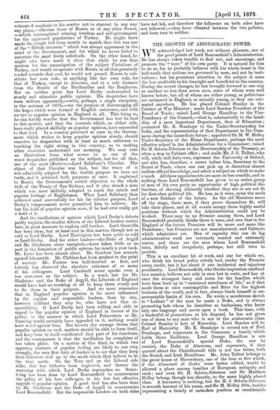THE VACILLATIONS OF PUBLIC OPINION, T 4 01WDERBY on Monday brought a
very vigorous and a not altogether unjust charge against the Public Opinion of this country. "If it were true in any respect," he said, "that English influence in the East was diminished, I should say it was diminished by a course of action which we deliberately and of our own free choice adopted. We chose to stand neutral,—conditionally neutral, if you please, but the condition did not lessen the neutrality,—we chose to stand neutral when we knew that Turkey must be defeated, and it is almost ridiculous now to say, that is quite true, but then, you see, when the war began we did not count on Russia obtaining such an accession of military prestige.' If you did not expect that, what did you expect? The truth is, that those whom I was once taken to task for calling our employers,—the public, —have not, from the beginning of this business to the end, known their own minds for six months together. Two years ago it would have been almost dangerous for any man to get up at a public meeting and express in plain terms his doubt as to the disinterested philanthropy of Russia. Now the cry is all the other way ; and as I believe I have been an object of criticism in these two agitations, I may speak with impartiality ; and I must say that the foolishness and virul- ence of each, does not leave much to choose between the two. If I could from this place address the English people, I would venture to ask them how they can expect to have a foreign policy.-1 do not say far-sighted, but even consistent and intelligent,—if within eighteen months the great majority of them are found asking for things directly contradictory. When we might have saved Turkey if we had chosen, not a voice was raised in favour of that course ; and now, when the enemy, if you choose to call him so, is still lodged at or near Constantinople, almost everybody is crying that we ought to turn him out." That is stated with the cold ability of which Lord Derby's speeches supply some of the best standards to be found in all the political oratory of England. But Lord Derby puts too much of the blame on the people, and accepts too little of it for himself. Who ever expected a large and careless nation which gives some attention indeed to politics, but only the lees of its attention to it, and a great deal more to private enter- prises,--the cause, to a great extent, of its political stability,— to keep a firm and steady opinion on a great issue on which two distinct currents of opposite feeling are always runniug, unless the leaders of the people do all in their power to keep their resolve steady and their feeling fixed ? For our own parts, we strongly believe that there have been, and may be again, Foreign Secretaries who would be able, even during a war of this kind which directly stimulates two quite opposite veins of sympathy in the popular mind, to fix and perhaps even to confirm the conviction once arrived at. But Lord Derby, with many qualities which must be admitted to be great, is not such a Minister, and is, indeed, the very opposite of such a Minister. From the first, he availed him- self, in his policy, of neither of the elements of popular feeling which he perceived. He was the first to deprecate the policy of defending Turkey against Russia. But in spite of so far taking the popular side, he was also the first to throw cold-water on anything like active sympathy with the Christian Provinces of Turkey, and to snub every attempt at an approximation to the Russian policy of eman- cipating Bulgaria. And this went so far that when, after the Conference of Constantinople, Russia presented an ulti- matum to Turkey in the name of the Conference, — though, of course, without its sanction,— Lord Derby censured Russia, in the coldest and most bitter protest he has ever written. And then, all through the war and the negotiations which followed it, his line was one of sus- picious non-committal. He would not even meet Russia in Congress without avowals which he did not expect to get, and though he was equally opposed, as we now know, to any warlike demonstrations against her, his policy through- out was a policy utterly destitute of popular elements,— nay, more, was one which disdained to avail itself even of such popular elements as it had. Even assuming Lord Derby's line of policy, he might have given far more warm and reiterated emphasis to his resolve not to obstruct in any way any plans,—whether those of Russia or of any other Power, —which contemplated winning freedom and self-government for the oppressed populations of Turkey. He might have made the people feel from month to month that this was one of the "British interests" which was always uppermost in the mind of the Government, and for which he never failed to entertain the most lively solicitude. On the other hand, he might also have made it clear that while he was thus anxious for the emancipation of the subject Christians of Turkey, and would co-operate with Russia in all that genuinely tended towards that end, he would not permit Russia to sub- stitute her own rule, or anything like her own rule, for that of Turkey, except in Armenia, and at a safe distance from the Straits of the Dardanelles and the Bosphorus. But on neither point has Lord Derby endeavoured to steady and stimulate public opinion. His despatches have been written apparently,—with, perhaps, a single exception, in the autumn of 1876,—for the purpose of discouraging all the hopes which were formed of English assistance, and with no eye to popular opinion in England at all. This being so, he can hardly wonder that the Government has lost its lead in this matter, and that the journals which, on either side, have really played skilfully on popular opinion, have succeeded to that lead. In a country governed as ours is, the Govern- ment which wishes to keep popular opinion steady, should conceive its despatches with at least as much reference to touching the right string in this country, as to making other countries understand our meaning. We may take an illustration from what seems to us one of the worst despatches published on the subject, but for all that, one of the most effective,—Lord Salisbury's Circular. The object of that Circular was bad, but the tenor of it was admirably adapted for the double purpose we have set forth, and it achieved both purposes at once. It explained to Russia the Government's rooted objection to the whole drift of the Treaty of San Stefano, and it also struck a note which was most skilfully adapted to reach the minds and popular feelings of Englishmen. What Lord Salisbury thus achieved most successfully for his far inferior purpose, Lord Derby's temperament never permitted him to achieve. He lost his hold of popular opinion soon, if he had ever really got a hold of it.
And the vacillations of opinion which Lord Derby's defects partly explain, the similar defects of the Liberal leaders contri- bute in great measure to explain still further. Lord Granville has been clear, but at least cool in this matter, though not so cold as Lord Derby. Lord Hartington has been quite as cold as Lord Derby. And the other leaders—the Duke of Argyll and Mr. Gladstone alone excepted,—have taken little or no part in the formation of public opinion for nearly a year back. Mr. Lowe has been almost silent. Mr. Goschen has scarcely opened his mouth. Mr. Childers has been prudent to the point of secrecy. Mr. Forster was half-hearted at first, and latterly has observed the absolute reticence of so many of his colleagues. Lord Cardwell never speaks even a few sentences on the subject. In a word, but for Mr. Gladstone and the Duke of Argyll, the Liberals of England would have had no teaching at all to keep them steady and to fix them in their purpose. And we must remember that in England -popular opinion is far more influenced by the regular and responsible leaders, than by any, however brilliant they may be, who have not that re- sponsibility. If Lord Derby had been willing and able to appeal to the popular opinion of England in favour of his policy, in the manner in which Lord Palmerston or Mr. Canning would certainly have appealed to it, nothing would have stood against him. But he—in the strange dream that popular opinion on such matters should be able to form itself, and keep true to itself—abdicated that part of his functions, and the consequence is that the vacillation he complains of has taken place. On a matter of this kind, in which two opposing currents of popular feeling are likely to run very strongly, the very first duty of leaders is to see that they keep their followers well up to the mark which they believe to be the true mark. On the Tory and on the Liberal side alike, this has hitherto been neglected, and thence the wavering with which Lord Derby reproaches us. Some- t'ling has been done by Lord Beaconsfield to countermine the policy of his late colleague, in his few but effective appeals to popular opinion. A good deal has also been done by Mr. Gladstone and the Duke of Argyll to countermine Lord Beaconsfield. But the responsible Leaders on both sides have not led, and therefore the followers on both sides have not followed ;—they have vibrated between the two policies, and been true to neither.



































 Previous page
Previous page